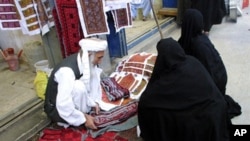Iran wants to forge stronger ties with neighboring Afghanistan. This week, Iranian companies took this mission to the Afghan capital, with an exhibition they hope will attract Afghan consumers interested in doing business with Iran.
Market for Iranian products
Hundreds of Afghans mill among stalls selling Iranian goods in the biggest exhibition of its kind in Kabul. More than 50 Iranian companies are here, hoping that Afghans will want to buy their products. Ali Dovarino is selling bakery ovens.
He says the market for commercial ovens is good in Afghanistan. Most of their bakeries are still quite traditional and their ovens use a lot of energy. He says we realized there is an opportunity here and so we brought ovens that don’t need as much electricity.
The Iranians are selling all sorts of things at this exhibition, from cookies to carpets, tires, pasta, plates, boilers and aluminum window frames. Majid Karimi is the CEO of the Iranian Gawhar plastic factory.
This is our first time in Afghanistan, he says. We would like to open an office and find a representative or wholesaler here who can promote our goods.
Karimi says it is a logical business move, because Iran and Afghanistan are so similar.
Many Afghans live in Iran, he says. I even have Afghans working in my factory there. We share many things, he says, we both speak the same language, we are both Muslim and we are neighbors, so it is easy for us to communicate with each other and I am sure that Afghans would like to buy Iranian products.
Abdul Rahuf Gulhari, an economics professor at Kabul University, says the reason Iranian businessmen are here is simple.
Iranians come here because there is no competition, he says, there’s no one to challenge them in business here, that’s why they are winning. He says Iran definitely has the upper hand in this relationship.
Exports from Afghanistan
Gulhari says Afghanistan exports about $200 million worth of goods and imports more than $2 billion. He says the Afghan government should support Afghan companies so they can produce more goods to help even out the trade imbalance.
He says if Afghanistan is to become self sufficient, then it needs more internal production, instead of sending money to Iran and bringing their goods here, Afghanistan should send its own products there. That would mean fewer problems and more benefits for Afghanistan, he says.
Ali Sheikh Zadar, the man in charge of the Iranian Exhibition in Kabul, says it is not just about one event, or even just about business.
We want to make this long-term, he says, not just have an exhibition here and leave. He says exhibit organizers want to build on the Kabul event and go to other provinces. And he says the exhibition is not just about exporting, it’s about creating a mutual relationship.
Zadar says there are already plans to hold a similar exhibit in the northern Afghan city of Mazar-i-Sharif, another event in Kabul next year, and in the meantime, invite Afghan businesses to visit Iran.




